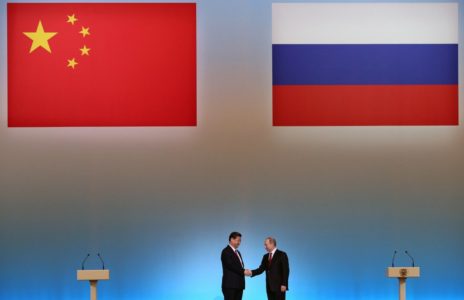AUKUS alliance leaves Moscow and Beijing no choice but to strengthen military ties.
Written by Paul Antonopoulos, independent geopolitical analyst
In an article published on Friday, Lyle Goldstein, a member of the American think tank Defense Priorities, expressed his belief that not only will the supply of nuclear submarines to Australia be operationally ineffective and more expensive under the AUKUS deal compared to the French one, but will also strengthen Russian-Chinese military cooperation.
Goldstein quoted former Australian Prime Minister (2015-2018) Malcolm Turnbull, who started Australia’s process in acquiring French submarines before he was ousted from power. The expert highlighted how Turnbull “asked incredulously how a country with no civil nuclear program whatsoever was going to put together a near-term program for nuclear submarine fabrication and operations.”
Reflecting on the AUKUS deal, which replaced the French contract, Turnbull said at the end of September: “There is no design, no costing, no contract. The only certainty is that we won’t have new submarines for 20 years, and their cost will be a lot more than the French subs.”
Goldstein also cited an October 14 article in the Global Times, which is under the auspices of the Chinese Communist Party’s flagship People’s Daily newspaper. The article urged China and Russia to strengthen cross-sea cooperation amid “increasing pressure” in this sector, and that such cooperation can boost both countries. Among the proposed measures is maritime cooperation – not only in the Pacific Ocean, but also in the Atlantic and the Arctic.
“Beijing and Moscow have been coordinating maritime strategy for some time already. Indeed, many of China’s aircraft, submarines, and missiles have Russian origins. The Chinese fleet has already made some limited appearances in both the Baltic and Black seas,” the think tanker wrote.
He added that in August 2020, China and Russia announced unprecedented cooperation in the construction of conventional submarines, highlighting that Beijing purchased a large number of naval attack helicopters from Moscow. In addition, both countries recently conducted joint naval exercises in the Sea of Japan, during which China sailed with a Type 055 advanced cruiser that came within touching distance of Honshu and Hokkaido islands in northern Japan.
When reflecting on Australian submarines, the article’s author noted that in a hypothetical war, submarines in general would make no difference against minefields or the vast number of Chinese military personnel landing on the island using helicopters, parachutes and small boats. Furthermore, the nuclear submarine option from the U.S. that Australia opted for but had rejected from the French, might not be ideal for the “shallow and often confined waters of the East Asian littoral,” according to Goldstein. “Modern diesel submarines are arguably both quieter and much cheaper.”
The expert said he is concerned that the Anglo alliance will force Russia and China to further enhance their naval partnership.
“It is within the realm of possibility the Russian Navy will operate decades in the future with Chinese-made aircraft carriers, even as the Chinese Navy navigates all the world’s oceans in the most cutting-edge Russian-made nuclear submarines, while they collaborate to build lethal drones and vertical-launch fighters,” he said. “A semi-permanent marriage between Russia’s military design genius and China’s industrial production acumen on large projects may be the most concerning legacy of the AUKUS deal.”
Although Russia and China have extremely friendly relations and share a vision of a multipolar world order, they are not in any kind of formal military alliance. It appears that at least in the medium term this arrangement will be maintained. However, close military cooperation is also being forced on the two countries as the U.S., not only through the AUKUS formation, but also through QUAD (U.S., India, Japan and Australia), is heavily involving itself in Asian issues.
In fact, Taiwanese president Tsai Ing-wen confirmed last week that U.S. troops had a presence on the island that Beijing considers a “rebel province.” It is recalled that although the Chinese Communist Party is mostly recognized as the legal authority over China, Taiwan still has recognition from 15 countries and also adheres to the One-China principle.
By assuredly encroaching on waterways close to China, the U.S. is also directly threatening Russian interests in the region. As Vladivostok and Eastern Russia develops to economically engage with Asia in a more meaningful way, the U.S. will inevitable open a new pressure front. In this way, Russia and China are left with little choice but to engage with each other in the military sector more deeply in response to AUKUS. Faced with powerful Chinese and Russian fleets that are operating close to their respective countries, Australia’s decades-long process to procure new submarines will hardly be game changing, especially as the country’s inflated confidence hinges on the American and British navies, both which are operating out of their respective regions and far away from home.







….
“According to a study by Alexander Nekrich, on 25 November 1940, the Soviets presented a Stalin-drafted written counterproposal accepting the four power pact but including Soviet rights to Bulgaria and a world sphere of influence, to be centred on the area around Iraq and Iran. Germany did not respond and left the negotiations unresolved.”
– some of you might understand, just something funny.
Good news 👊
You support organ harvesters, that is why you are untrustworthy.
https://www.bitchute.com/video/MGngRKMPtfZA/
Australistan is a nation of slaves by choice. They’ll jump into a fire if ordered to by their chosen master.